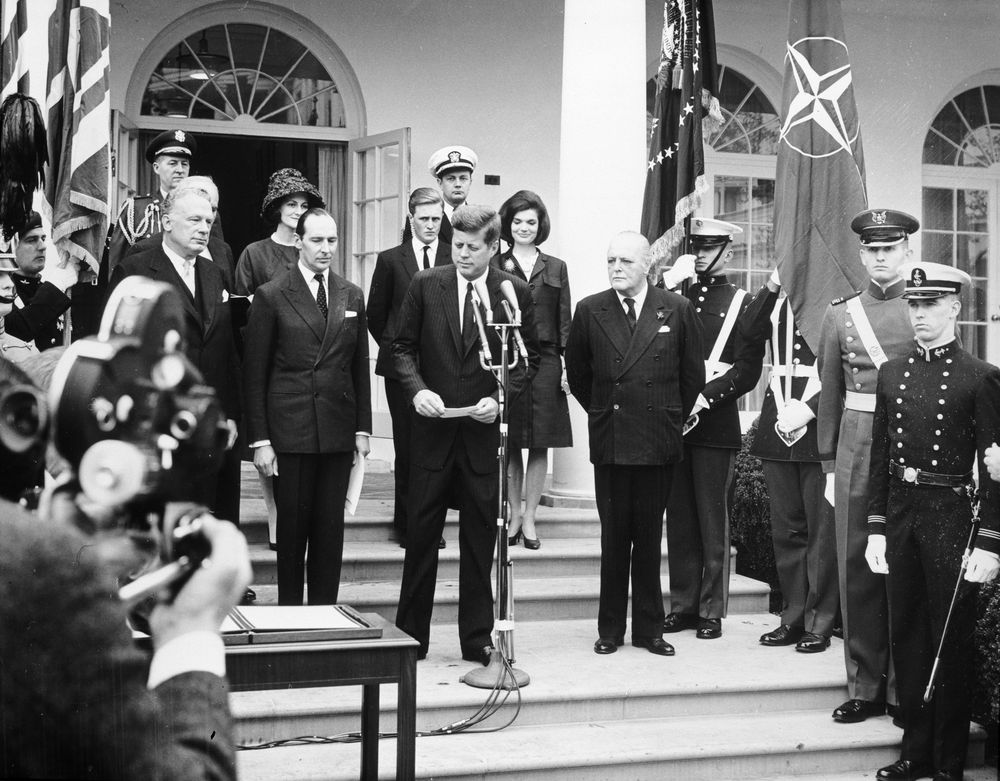
Enduring Legacy: U.S. National Churchill Day April 9th
Washington, 1963
Jacqueline Kennedy offered a touching and durable vision of Churchill’s legacy at the White House ceremony on 9 April 1963—now “Churchill Day” in America. It was when President Kennedy bestowed honorary U.S. citizenship on Sir Winston.
Aged 88, Churchill was represented by his son Randolph, who was a bundle of nerves. In the Oval Office beforehand, the First Lady recalled, “Randolph was ashen, his voice a whisper. ‘All that this ceremony means to [Randolph and the President],’ I thought, ‘is the gift they wish it to be for Randolph’s father.’”
“Randolph stepped forward to respond: ‘Mr. President.’ His voice was strong. He spoke on, with almost the voice of Winston Churchill, speaking for his father.”
Legacy and Liberty
Churchill’s message, so ably delivered by his son at that ceremony fifty-six years ago, calls to us again across the years, amidst fresh challenges to liberty.
In this century of storm and tragedy, I contemplate with high satisfaction the constant factor of the interwoven and upward progress of our peoples…. Our comradeship and our brotherhood in war were unexampled. We stood together, and because of that fact the free world now stands. Nor has our partnership any exclusive nature: the Atlantic community is a dream that can well be fulfilled to the detriment of none and to the enduring benefit and honour of the great democracies.
Those words testify to why the legacy of Churchill still matters. They explain why, after the most critical attacks against any statesman of the recent past, his reputation survives. We still heed and quote him. Churchill’s legacy endures because of his ability to crystallize the convictions and aspirations of free men and women. No one spoke them better.
Legacy and Longevity
That legacy also involves longevity. From the last great British cavalry charge at Omdurman to the nuclear age, Churchill was there. Most politicians are prominent for ten or twenty years. Churchill stood at the apex of events for half a century. Read about him and you’ll find he was more than a fleeting figure in a war long ago.
Thoughtful people know Churchill’s story offers much more than the courageous figure of 1940. More than ordinary politicians, he reflected seriously on the nature of democracy, on the proper role of the state. He thought repeatedly about how to maintain peace without resort to war. Always he nursed a determined optimism that in the end “all will come right.”
It is easy today for the uninformed to portray Churchill as a grotesque—even the opposite to what he really was. Did he make mistakes? Certainly. Did he contradict himself? Frequently. But he “always had second and third thoughts,” as William Manchester wrote,
and they usually improved as he went along. It was part of his pattern of response to any political issue that while his early reactions were often emotional, and even unworthy of him, they were usually succeeded by reason and generosity. Given time, he could devise imaginative solutions.
As he reflected upon his honorary American citizenship he concluded: “Our past is the key to our future, which I firmly trust and believe will be no less fertile and glorious. Let no man underrate our energies, our potentialities and our abiding power for good.”
That is his legacy. We seek to learn by his experience and wisdom. Today as always, it is eerily relevant.







One thought on “Enduring Legacy: U.S. National Churchill Day April 9th”
As always, great article. Very informative and pointed Enjoyed very much by this Dutch American.
Comments are closed.